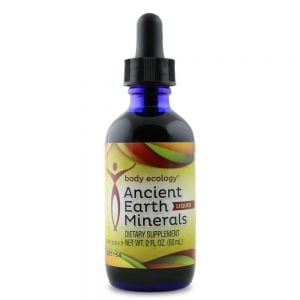Hashimoto’s Unlocked: The Key to a Sluggish Thyroid
Hashimoto’s disease isn’t just a name we use to describe hypothyroidism, or an underactive thyroid.
Supporting your immune system can support recovery from an autoimmune disease like Hashimoto’s. Taking a daily dose of pure minerals, such as liquid Ancient Earth Minerals, may help to nourish the thyroid and adrenals, improve energy and digestive health, and boost immunity.
Hashimoto’s disease is an autoimmune disease that affects how much thyroid hormone you have floating around in your bloodstream. Because of a marked increase in autoimmune disease — now considered a major health problem by the American Autoimmune Related Diseases Association (AARDA) — you’re likely to hear more about autoimmune conditions like Hashimoto’s in the media. The National Institutes of Health (NIH) confirms that over 23 million Americans suffer from autoimmune disease, and that number is only expected to rise. Yet the AARDA estimates that number even higher at 50 million Americans, including a broader spectrum of autoimmune diseases that the NIH did not account for.1
When you have Hashimoto’s disease, your immune system attacks your body — making it very difficult to produce enough thyroid hormone. Thyroid hormone helps regulate metabolism and energy levels. It also helps keep the body warm. As University of Calgary researchers confirmed in 2016 when investigating a new drug used to treat autoimmune disease, autoimmune disease occurs when the body’s “defender” white blood cells accidentally attack and destroy the body’s own “good” cells.2
Without enough thyroid hormone, you may:
- Feel tired
- Feel cold
- Feel depressed
- Find it difficult to lose weight
- Have constipated, irregular bowel movements
As the most common cause of hypothyroidism, Hashimoto’s disease is both a thyroid disorder and an autoimmune disease. In addition to supporting thyroid health, it is essential to support the immune system during recovery.
Your Immune System and Hashimoto’s Disease
When we get into the nitty-gritty details about Hashimoto’s disease, we find that the immune system mounts an attack against the machinery that produces thyroid hormone.
For example, the immune system can attack:
- Thyroglobulin, a protein that is the “bare bones” of thyroid hormone
- Thyroid peroxidase, an enzyme that kicks off a number of reactions that make thyroid hormone
- TSH receptor, the receptor site for thyroid stimulating hormone
Once this happens, the immune system invades the thyroid gland, slowly destroying it.
TIP: If you are screened for Hashimoto’s disease, checking levels of TSH isn’t enough. Make sure your physician also looks for antibodies (an immune response) against thyroglobulin (TGB) and thyroid peroxidase (TPO).
While it is still unclear what causes Hashimoto’s in the first place, we do see a couple of trends:
- Autoimmune thyroid disease is less common in children.3
- Autoimmune thyroid disease is more common in women and after pregnancy, with increasing risk as a woman ages.4,5
- Autoimmune thyroid disease is influenced by genetics.6
This does not mean that children or men are not affected by Hashimoto’s disease.
It simply means that women — especially after pregnancy and with fluctuations in their immune system — are more vulnerable to developing Hashimoto’s disease. And this has to do with the complex dialogue that happens between a woman’s reproductive hormones and her immune system.
Your Gut and Hashimoto’s Disease
A large portion of the immune system is in the digestive tract.7 This means that anything threatening the health of the gut also threatens the stability of the immune system — ultimately fueling Hashimoto’s disease flare-ups. For example, researchers have found that pro-inflammatory signals from the immune system can make or break your immune tolerance.8 These signals play an important role in immune system balance and in the development of Hashimoto’s disease.
But that’s not all.
Researchers at the University of Edinburgh found that levels of thyroid hormone fall during infection, especially when the gut is leaky and toxins from bacteria are released into the bloodstream.9,10 Even though levels of the stress hormone cortisol rise and levels of thyroid hormone drop, TSH (thyroid stimulating hormone) levels remain the same.11
This means that you may have signs of hypothyroidism during an infection, even though standard lab tests show that your thyroid is functioning within range. If you have Hashimoto’s, your body may not be producing enough thyroid hormone in the first place. An infection — like Candida overgrowth or dysbiosis — can be absolutely devastating to someone with Hashimoto’s disease.
Recover from Hashimoto’s Disease with Probiotic Foods
At Body Ecology, we have found that healthy bacteria and yeast living in the digestive tract are essential to the wellbeing of the immune system. This synergistic environment is called the inner ecosystem. Over the last several years, research around the inner ecosystem has skyrocketed. Besides autoimmune disease, a wounded inner ecosystem contributes to other immune-related disorders like allergies, obesity, inflammatory bowel disease, and diabetes.12
One of the best ways to support your inner ecosystem and your immune system is with cultured foods, like coconut water kefir and fermented vegetables. These probiotic foods contain beneficial bacteria and yeast that get rid of infection within the gut. And they help to reduce levels of the stress hormone cortisol.
Supplementing with minerals is also critical to nourish the thyroid and strengthen immunity.
Body Ecology’s Ocean Plant Extract contains bioavailable ionic iodine, from highly concentrated seaweed, for thyroid support and is rich in essential sugars that can enhance cellular communication and immune function. Ancient Earth Minerals, available in liquid or capsule form, contains a premium blend of humic, fulvic, micro and macro minerals, and amino acids that help to nourish the thyroid, detoxify the body, and support immunity.
As with all autoimmune disease, one of the best things you can do for your health is to support your immune system. Remember that pro-inflammatory signals feed an autoimmune response, but strengthening gut health can help to improve and balance immunity. Even without an official Hashimoto’s diagnosis, this thyroid and immune care is critical. Hashimoto’s thyroiditis can still compromise quality of life and cause unpleasant symptoms like fatigue and digestive distress when thyroid function appears to be normal.13
What To Remember Most About This Article:
Hashimoto’s disease is an autoimmune disease that occurs when the immune system attacks the body and makes it difficult to produce enough thyroid hormone. Thyroid hormone is necessary to regulate metabolism and energy and keep the body warm. With Hashimoto’s, you may feel tired, cold, and depressed and have difficulty losing weight. You may also have irregular bowel movements due to constipation.
A significant portion of the immune system is found in the gut. Poor gut health can threaten immunity and even trigger Hashimoto’s flare-ups. The best way to support your health with autoimmune disease is to recover immunity.
Healthy bacteria and yeast in the digestive tract can strengthen immunity with a robust inner ecosystem:
- Cultured foods like coconut water kefir and fermented vegetables can help rid the gut of infection.
- Highly concentrated minerals, like those found in Ocean Plant Extract and Ancient Earth Minerals, can nourish the thyroid while strengthening immunity.
- Eating the Body Ecology way with gluten-free and sugar-free foods will support a healthy probiotic environment in the gut.
REFERENCES:
- “Autoimmune Statistics.” American Autoimmune Related Diseases Association.
- Xavier Clemente-Casares, Jesus Blanco, Poornima Ambalavanan, Jun Yamanouchi, Santiswarup Singha, Cesar Fandos, Sue Tsai, Jinguo Wang, Nahir Garabatos, Cristina Izquierdo, Smriti Agrawal, Michael B. Keough, V. Wee Yong, Eddie James, Anna Moore, Yang Yang, Thomas Stratmann, Pau Serra, Pere Santamaria. Expanding antigen-specific regulatory networks to treat autoimmunity. Nature, 2016; DOI: 10.1038/nature16962.
- Marwaha, R. K., Tandon, N., Desai, A. K., Kanwar, R., Sastry, A., Narang, A., … & Mani, K. (2012). The evolution of thyroid function with puberty. Clinical Endocrinology, 76(6), 899-904.
- Hollowell, J. G., Staehling, N. W., Flanders, W. D., Hannon, W. H., Gunter, E. W., Spencer, C. A., & Braverman, L. E. (2002). Serum TSH, T4, and thyroid antibodies in the United States population (1988 to 1994): National Health and Nutrition Examination Survey (NHANES III). The Journal of Clinical Endocrinology & Metabolism, 87(2), 489-499.
- Tomer, Y., & Shoenfeld, Y. (1988). Ageing and autoantibodies. Autoimmunity, 1(2), 141-149.
- Brix, T. H., Kyvik, K. O., & Hegedüs, L. (2000). A Population-Based Study of Chronic Autoimmune Hypothyroidism in Danish Twins 1. The Journal of Clinical Endocrinology & Metabolism, 85(2), 536-539.
- Wershil, B. K., & Furuta, G. T. (2008). 4. Gastrointestinal mucosal immunity. Journal of Allergy and Clinical Immunology, 121(2), S380-S383.
- Mikoś, H., Mikoś, M., Obara-Moszyńska, M., & Niedziela, M. (2014). The role of the immune system and cytokines involved in the pathogenesis of autoimmune thyroid disease (AITD). Endokrynologia Polska, 65(2), 150-155.
- Warner, M. H., & Beckett, G. J. (2010). Mechanisms behind the non-thyroidal illness syndrome: an update. Journal of Endocrinology, 205(1), 1-13.
- Boelen, A., Kwakkel, J., Thijssen-Timmer, D. C., Alkemade, A., Fliers, E., & Wiersinga, W. M. (2004). Simultaneous changes in central and peripheral components of the hypothalamus-pituitary-thyroid axis in lipopolysaccharide-induced acute illness in mice. Journal of Endocrinology, 182(2), 315-323.
- Luis, D., & Annane, D. (2013). The neuroendocrine response 0 to critical illness. Brain Disorders in Critical Illness: Mechanisms, Diagnosis, and Treatment, 181.
- Clemente, J. C., Ursell, L. K., Parfrey, L. W., & Knight, R. (2012). The impact of the gut microbiota on human health: an integrative view. Cell, 148(6), 1258-1270.
- Johannes Ott, Regina Promberger, Friedrich Kober, Nikolaus Neuhold, Maria Tea, Johannes C. Huber, Michael Hermann. Hashimoto’s Thyroiditis Affects Symptom Load and Quality of Life Unrelated to Hypothyroidism: A Prospective Case–Control Study in Women Undergoing Thyroidectomy for Benign Goiter. Thyroid, 2011; 21 (2): 161 DOI: 10.1089/thy.2010.0191.









